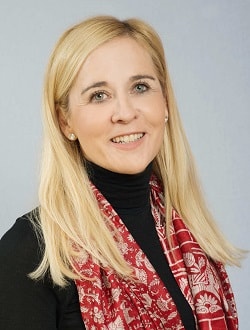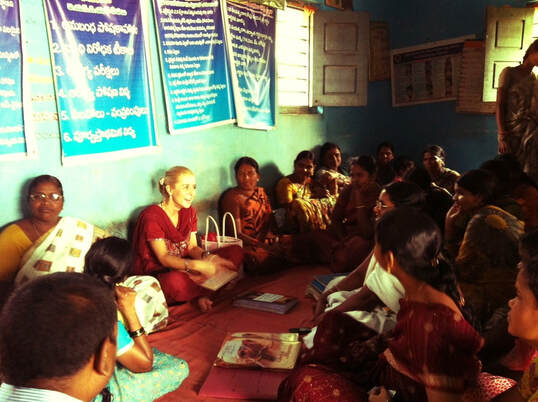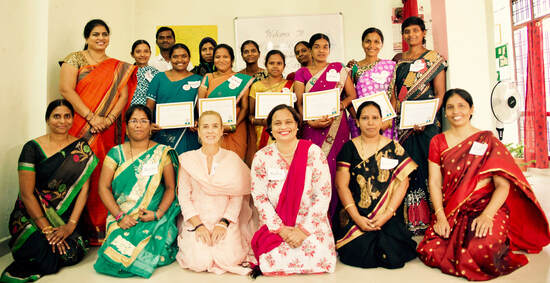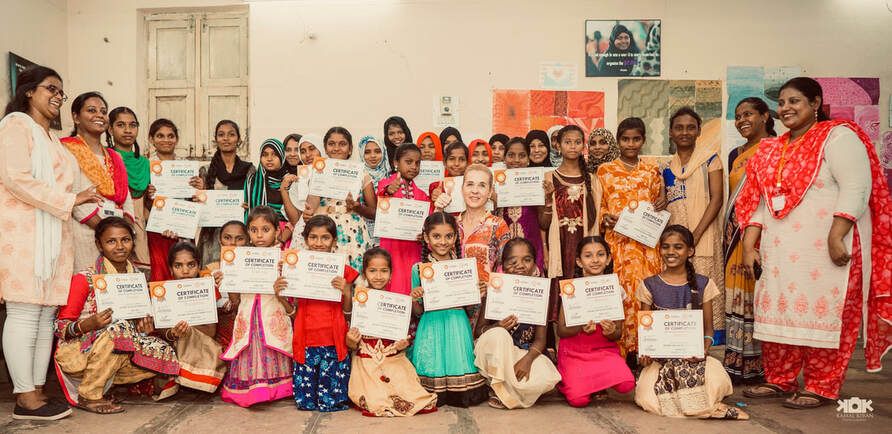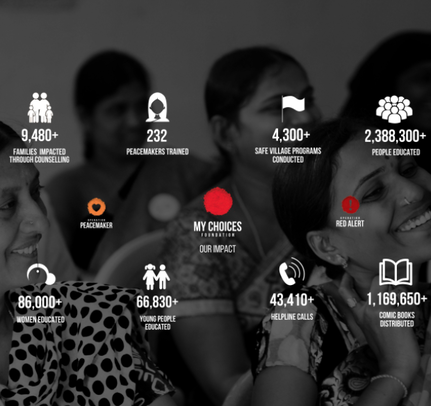October 2020 Featured Interview
|
|
Interview with
Elca Grobler
Founder of My Choices Foundation
Photo Courtesy: My Choices Foundation
About Elca:
Elca Grobler, founder of the My Choices Foundation, left a career in investment banking and finance in 2011 to follow her calling – serving women and girls in India by working for their empowerment. Since its founding in 2012, the My Choices Foundation has grown to become a national leader in addressing domestic violence and sex trafficking in India. It has been recognized internationally for the ingenuity and impact of its work.
Under Elca’s leadership, the foundation has helped to peacefully resolve over 8,828 cases of domestic violence and has equipped over 2.3 million individuals, those living in high-risk areas across eight states, to stay safe from sex trafficking. Through its anti-trafficking initiative, My Choices Foundation has established the first national helpline exclusively for trafficking and is leading the coalition effort to prevent sex trafficking.
Elca’s numerous honors include being awarded one of the “50 Most Impactful Social Innovators” award and the AGSM Alumni Award for Social Impact and Public Policy for her work in India. She was also recognized as one of the “100 Most Impactful CSR Leaders” by World Sustainability Congress and World Federation of CSR Professionals for three consecutive years (2018, 2019, and 2020). The Red Alert Research Paper, which she co-authored with behavioral architects of Final Mile, won the 2016 ESOMAR Award for Excellence in market research and has become a seminal document for anti-trafficking program development.
My Choices Foundation has been recognized for its creative campaigns addressing gender-based violence, and in 2017, the foundation created the world’s first VR documentary on sex trafficking. Notes to My Father was showcased at Sundance Film Festival and made its world premiere as an Official Selection at SXSW Film Festival in March 2017.
Elca Grobler, founder of the My Choices Foundation, left a career in investment banking and finance in 2011 to follow her calling – serving women and girls in India by working for their empowerment. Since its founding in 2012, the My Choices Foundation has grown to become a national leader in addressing domestic violence and sex trafficking in India. It has been recognized internationally for the ingenuity and impact of its work.
Under Elca’s leadership, the foundation has helped to peacefully resolve over 8,828 cases of domestic violence and has equipped over 2.3 million individuals, those living in high-risk areas across eight states, to stay safe from sex trafficking. Through its anti-trafficking initiative, My Choices Foundation has established the first national helpline exclusively for trafficking and is leading the coalition effort to prevent sex trafficking.
Elca’s numerous honors include being awarded one of the “50 Most Impactful Social Innovators” award and the AGSM Alumni Award for Social Impact and Public Policy for her work in India. She was also recognized as one of the “100 Most Impactful CSR Leaders” by World Sustainability Congress and World Federation of CSR Professionals for three consecutive years (2018, 2019, and 2020). The Red Alert Research Paper, which she co-authored with behavioral architects of Final Mile, won the 2016 ESOMAR Award for Excellence in market research and has become a seminal document for anti-trafficking program development.
My Choices Foundation has been recognized for its creative campaigns addressing gender-based violence, and in 2017, the foundation created the world’s first VR documentary on sex trafficking. Notes to My Father was showcased at Sundance Film Festival and made its world premiere as an Official Selection at SXSW Film Festival in March 2017.
|
About My Choices Foundation:
Founded in 2012, the My Choices Foundation is a Hyderabad-based NGO dedicated to ending violence, abuse, and exploitation against women and girls in India. The foundation addresses two of the most prevalent and intractable forms of abuse - domestic violence and trafficking of young girls for sexual exploitation. Its work is carried out through two major initiatives: Operation PeaceMaker aims to reduce domestic violence in India through thousands of empowered community women (PeaceMakers) who are trained in family and marriage counseling as well as all aspects of the Protection of Women from Domestic Violence Act 2005. Operation Red Alert works throughout India to prevent the sex trafficking of young girls through grassroots education, the National Anti-Trafficking Helpline (1 800 419 8588), and mass media campaigns. The campaign’s Safe Village Programs are conducted in eight states: West Bengal, Telangana, Andhra Pradesh, Karnataka, Maharashtra, Jharkhand, Rajasthan and Bihar. |
|
Through the porthole of modern technology, Myrna Haskell, executive editor, was able to talk to AND ‘see’ the leader responsible for helping to protect an extraordinary number of women and girls in India. Elca discusses why both domestic violence and sex trafficking is so prevalent in India and how her foundation has developed sustainable programs that reach entire communities.
You’re originally from South Africa and your education and career focus was in the finance sector. How did you wind up in India as a nonprofit leader?
Our first move was to Sydney, Australia…then to India. I worked in consulting while in Sydney, and I loved the stimulation of the corporate world. My husband and I were on some nonprofit boards as well, and I realized that I had a deep desire to speak for those who are oppressed and cannot speak for themselves. You know…it’s that thing that keeps you up at night…and, for me, it was a desire for social justice for women and girls. This became my calling when we settled in India.
You’re originally from South Africa and your education and career focus was in the finance sector. How did you wind up in India as a nonprofit leader?
Our first move was to Sydney, Australia…then to India. I worked in consulting while in Sydney, and I loved the stimulation of the corporate world. My husband and I were on some nonprofit boards as well, and I realized that I had a deep desire to speak for those who are oppressed and cannot speak for themselves. You know…it’s that thing that keeps you up at night…and, for me, it was a desire for social justice for women and girls. This became my calling when we settled in India.
|
Did you originally go to India to help women become financially independent? If so, what was the reason for a change in focus to helping abused women and preventing girls from being sold into the sex trafficking industry?
The first six months I was there, I met with women in urban slum areas (I attended sewing groups and other informal groups) as well as leaders of local NGOs. I kept hearing over and over again that, although financial literacy was important, the issue that needed attention first was domestic violence. Women would say, ‘I’m being abused with nowhere to turn.’ So protecting women became the focus. These women are often married off at a very young age. You also have to understand the cultural ramifications of divorce in India – it’s just not an acceptable alternative. There is a very progressive Domestic Violence Protection Act (2005) in place, but 70% of women don’t know that this law even exists! They don’t realize that there’s a law that states that it’s illegal for men to abuse their wives or that they have rights and can seek protection. |
Elca with Women's Group
(Photo Courtesy: My Choices Foundation) |
Close to 50% of women in India face abuse in their home. What have you found is the reason behind such a high percentage?
There are underlying social structures that shape and allow this to happen. India is a patriarchal society, and a big portion of the population still [abide by] a dowry system. When a girl gets married – often when she’s still a child - her parents must pay a dowry of money and/or gifts to the groom’s family. In many cases, the family has to sell things or take out loans to pay the dowry. In essence, the dowry system leads to girls being seen as a commodity that is being traded – she is not recognized for her true value.
There are underlying social structures that shape and allow this to happen. India is a patriarchal society, and a big portion of the population still [abide by] a dowry system. When a girl gets married – often when she’s still a child - her parents must pay a dowry of money and/or gifts to the groom’s family. In many cases, the family has to sell things or take out loans to pay the dowry. In essence, the dowry system leads to girls being seen as a commodity that is being traded – she is not recognized for her true value.
|
"I always say that India can overwhelm you with her love, but she can also destroy you with her violence – especially if you are a woman or a girl." ~ Elca Grobler |
There are horrific consequences, such as feticide (selective abortions) and infanticide (killing baby girls once they are born). Girls being seen as commodities also leads to the trafficking of young girls.
An Indian girl, between the ages of one and five years, is 75% more likely to die than an Indian boy of the same age. For instance, it’s likely they are not taken to the doctor when they get sick or not fed if there isn’t enough food to eat. Basically, a girl is considered a burden. It’s like she’s born on a chess set and moved around like a pawn. |
[Official statistics say an estimated 31.1% of women in India (i.e. over 200 million women) have experienced domestic violence, but this number is restricted to married women in the 15-49 age group only. The number of unreported cases of domestic violence among women and girls by men who are family members, acquaintances, neighbors, teachers, officials, etc. is staggeringly higher. ~ My Choices Foundation]
|
What does the foundation do to educate women so that they know how to seek help if they are being abused by a husband or other male figure in their life? We work with counselors, and we also equip local women to become the change agents in their communities. There is a reluctance to come forward with complaints of violence and abuse because of a common belief that domestic violence is an accepted form of behavior in the common patriarchal home, and this makes women in India more vulnerable and susceptible to abuse. Furthermore, a boy is five times more likely to become abusive as an adult if he sees his father abusing his mother. So we focus on changing the cycle of violence. We teach families to address what causes the violence and teach them tools to diffuse the situation when it’s happening. |
Photo Courtesy: My Choices Foundation
|
It is important that our solution to these problems is sustainable and relief-based, while also respecting religious and community sentiments. A cornerstone of our Operation PeaceMaker (OPM) program [the arm of the foundation that addresses domestic abuse] is that it focuses efforts on counseling through mediation that includes the entire family, and our ‘PeaceMakers’ are local women whom the community trusts.
We work with entire villages - when a man is ‘called out’ by the community, he’s less likely to continue the behavior. People from low socioeconomic backgrounds fear the police. So the threat of police intervention carries a lot of weight, and the man soon realizes that he cannot get away with the abuse.
We have five counseling centers* that provide 100% free counseling, rights education, and legal aid to victims of violence and their families. We believe that domestic violence can be stopped by healing and reconciling families in a peaceful manner and will resort to further action [the foundation has strong partnerships with local police] only when such an option is no longer available.
The My Choices Foundation has five fully operational counseling centers in the state of Telangana (4 in Hyderabad and 1 in Warangal) – with recent expansions to three other States: West Bengal, Jharkand and Rajasthan.
We work with entire villages - when a man is ‘called out’ by the community, he’s less likely to continue the behavior. People from low socioeconomic backgrounds fear the police. So the threat of police intervention carries a lot of weight, and the man soon realizes that he cannot get away with the abuse.
We have five counseling centers* that provide 100% free counseling, rights education, and legal aid to victims of violence and their families. We believe that domestic violence can be stopped by healing and reconciling families in a peaceful manner and will resort to further action [the foundation has strong partnerships with local police] only when such an option is no longer available.
The My Choices Foundation has five fully operational counseling centers in the state of Telangana (4 in Hyderabad and 1 in Warangal) – with recent expansions to three other States: West Bengal, Jharkand and Rajasthan.
How are the PeaceMakers trained to provide help to women and families?
There is a three-week training process for our ‘PeaceMakers.’ This training program is led by professional counselors and lawyers who aim to empower the PeaceMakers with the counseling skills, legal knowledge (Domestic Violence Act 2005 and POCSO), infrastructure and processes required to be agents of change in their communities. When the victims find out that the law is on their side, they are more apt to seek help.
There is a three-week training process for our ‘PeaceMakers.’ This training program is led by professional counselors and lawyers who aim to empower the PeaceMakers with the counseling skills, legal knowledge (Domestic Violence Act 2005 and POCSO), infrastructure and processes required to be agents of change in their communities. When the victims find out that the law is on their side, they are more apt to seek help.
|
Warrangal PeaceMakers
(Photo Courtesy: My Choices Foundation) |
We also strive to reduce the suffering of women and children as a result of other societal ills, such as child marriages, infanticide, selective feticide, sexual abuse, poor female health and sex trafficking.
In the state of Telangana, India, OPM is one of the few service providers offering free counseling, rights education and legal aid to victims of domestic violence, sexual abuse and their families. The program is unique in its focus on men as part of the solution, rather than just the problem. Men become our allies. We counsel men with equal empathy and equal determination, knowing that if men do not become a willing part of the change, then the abuse will only continue. |
|
Has domestic violence increased during the COVID-19 pandemic?
I’ve heard this is the case in many places around the world, and India is no exception. There has been a huge spike in domestic violence, and these are just the instances that have been reported to the police. There’s very little space – the homes are very small, and with more people in the home, it makes things very difficult. The situation has been called a ‘pandemic within a pandemic.’ After the lockdown, many Indian women felt there was nowhere to turn - if you go into the street, you get killed by the virus; but if you stay in your home, you can be killed by your husband. Child abuse has also been on the rise. The national Child Abuse Helpline received 92,000 calls in just 11 days. We had to switch our focus to get relief to these communities literally overnight. We’ve been working for five months on relief work which includes the distribution of food to those in need. We’ve partnered with other organizations to provide this relief while continuing to offer our counseling and educational services to women and their families. |
Photo Courtesy: My Choices Foundation
|
We also launched the National Toll-Free Domestic Violence helpline in order to reach as many women as possible.
[The foundation’s counseling centers are now open, and all precautions are being taken to keep everyone safe.]
[The foundation’s counseling centers are now open, and all precautions are being taken to keep everyone safe.]
|
I was shocked to hear that every three minutes a young girl (usually around the age of 12) gets trafficked in India. Why is this number so high? Are they usually taken directly from their families or stolen from off of the streets?
In the urban areas, it’s different - you have intergenerational brothels. But it is in the rural areas where most young girls are taken peacefully - directly from their families – because someone they know from the village promises a better life for their daughter (to be educated, given a job or married to someone who will take care of her). The fathers have no idea their daughters are being delivered into sex slavery. And, in most cases, the parents of the girl do not receive any form of compensation. These traffickers look for families who are struggling financially – those with many daughters who are probably not even attending school. |
From April 2016 through September 2020, Operation Red Alert (the anti-trafficking arm of the foundation) has conducted 4,300+ Safe Village Programs and has reached a total of 2,300,000+ people through workshops and activities, including the distribution of 1,100,00 comic books to children in the villages where the program was held. |
These girls are taken to underground basements where no one can find them. If the girl is from southern India, she is taken to northern India, where she cannot understand the language because it is completely different. This takes away her ability to ask for help.
Only 1% of girls who are taken are rescued. Once they’re gone, they’re just gone. They are raped by up to 40 men a day and usually don’t make it to their 19th birthday.
Only 1% of girls who are taken are rescued. Once they’re gone, they’re just gone. They are raped by up to 40 men a day and usually don’t make it to their 19th birthday.
There is a multifaceted approach to how you are helping in this area. You are educating entire villages. Are you also working with local law enforcement at all to find out which areas are being targeted?
There are eight states (countries within a country, really) and over 600,000 villages in India! So it’s imperative that we identify which villages are most vulnerable. We partnered with Quantium, a data analytics company, to build India’s first mapping tool. Law enforcement was also involved, but our partnerships with local NGOs provided much needed guidance because they knew the people in the villages.
In general, there are four focus areas: rescue, rehabilitation, restoration and prevention. Prevention is the area we are focused on. You don’t need the other three if families are educated about how to protect their daughters.
We talk to the fathers on their terms because we believe in the good in the fathers.* Many of these families are farmers with lots of responsibilities, and they are already completely overwhelmed. So we approach them with this analogy: What do you do to grow a healthy crop? You feed and water the crop until harvest. You need to nurture your daughters in the same way until adulthood.
Our Safe Village Programs use skits, videos, in-person interactions and engaging comic books to reach children. We also utilize volunteers from villages (Rakshaks) – those who know how to spot girls who aren’t going to school…girls who are most vulnerable. They contact us so we know where to focus our attention.
For an even broader reach, we’ve developed online programs with training modules on various topics.
*The ‘Good Father’ campaign was born from the results found during an 18-month research project that studied why the traffickers were able to convince fathers to let their daughters go as well as the mindset of the traffickers themselves.
There are eight states (countries within a country, really) and over 600,000 villages in India! So it’s imperative that we identify which villages are most vulnerable. We partnered with Quantium, a data analytics company, to build India’s first mapping tool. Law enforcement was also involved, but our partnerships with local NGOs provided much needed guidance because they knew the people in the villages.
In general, there are four focus areas: rescue, rehabilitation, restoration and prevention. Prevention is the area we are focused on. You don’t need the other three if families are educated about how to protect their daughters.
We talk to the fathers on their terms because we believe in the good in the fathers.* Many of these families are farmers with lots of responsibilities, and they are already completely overwhelmed. So we approach them with this analogy: What do you do to grow a healthy crop? You feed and water the crop until harvest. You need to nurture your daughters in the same way until adulthood.
Our Safe Village Programs use skits, videos, in-person interactions and engaging comic books to reach children. We also utilize volunteers from villages (Rakshaks) – those who know how to spot girls who aren’t going to school…girls who are most vulnerable. They contact us so we know where to focus our attention.
For an even broader reach, we’ve developed online programs with training modules on various topics.
*The ‘Good Father’ campaign was born from the results found during an 18-month research project that studied why the traffickers were able to convince fathers to let their daughters go as well as the mindset of the traffickers themselves.
Shakti Graduation: Empowering Young Girls
(Photo Courtesy: My Choices Foundation)
(Photo Courtesy: My Choices Foundation)
Is this gender-based abuse and violence more of a cultural problem or a financial problem in India?
It’s more of a cultural problem - the general notion that girls are a burden on the family. The dowry system and other accepted practices, such as girls being married off at a young age, all play a role.
Where do you find sanctuary?
I’m Christian, and my faith keeps me going. I start my day with prayer, and I fall to my knees at night to do the same. I’ve also learned along the way that my grieving for these women is not a weakness; it is a part of a journey toward healing.
Elca becomes emotional…
When I see the gratitude in these women’s eyes…when they say, ‘No one has asked me this before or wanted to help in this way’…well…this is what keeps me going.
It’s more of a cultural problem - the general notion that girls are a burden on the family. The dowry system and other accepted practices, such as girls being married off at a young age, all play a role.
Where do you find sanctuary?
I’m Christian, and my faith keeps me going. I start my day with prayer, and I fall to my knees at night to do the same. I’ve also learned along the way that my grieving for these women is not a weakness; it is a part of a journey toward healing.
Elca becomes emotional…
When I see the gratitude in these women’s eyes…when they say, ‘No one has asked me this before or wanted to help in this way’…well…this is what keeps me going.

